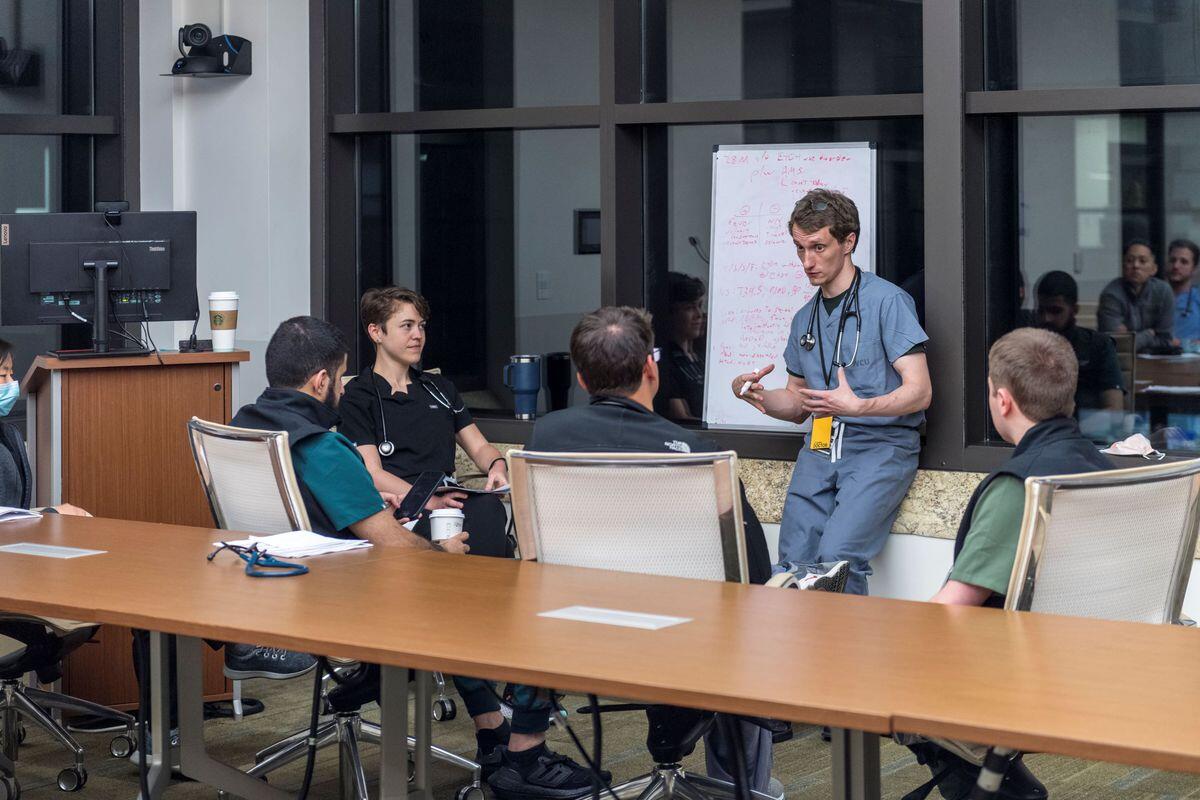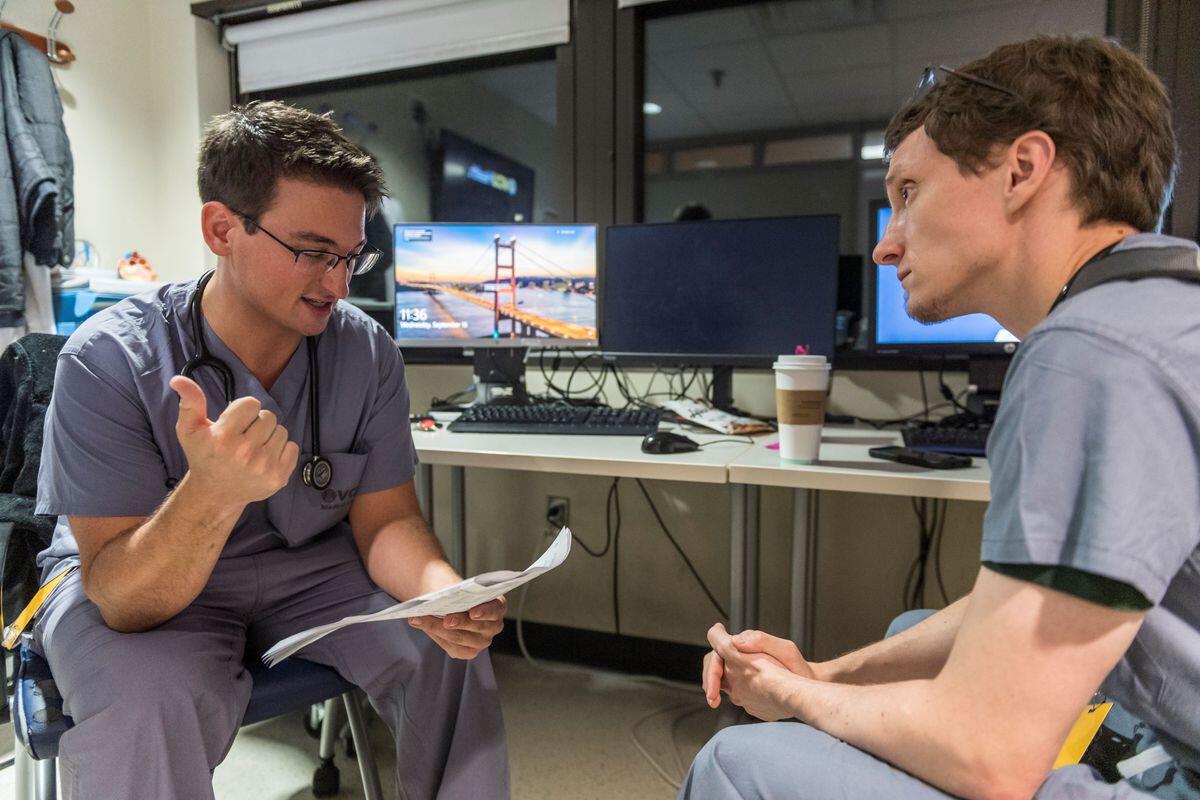
Feb. 5, 2024
VCU is creating a national model for the nighttime education of new doctors
Share this story
Timothy V. Johnson, M.D., has advice for residents starting their nighttime rotations. Blackout curtains are good for sleeping during the day. Melatonin can help.
But the best thing Johnson can give a new doctor charged with patients’ health is a sense of purpose.
“Adjusting to working at night has a lot to do with mindset,” Johnson said. “Some residents may think, ‘We’re getting the patients through the night and then we’ll hand them off.’ But this is an opportunity to learn and grow as physicians.”
An academic nocturnist and assistant professor of medicine at the Virginia Commonwealth University School of Medicine, Johnson has worked to banish the phrase “night float” along with the concept of a night shift as an unpleasant but necessary rite of passage for residents. As director of night medicine at VCU, he’s part of a team of attending physicians that trains the next generation of internists while others sleep.
It’s an innovative model that’s gaining momentum nationally – and the MCV Campus is leading the way.
“We’re trying to really empower the residents to take ownership of their patients’ health,” said Johnson, a VCU alum. “To recognize that the night is actually half of the day.”
A shift in how to think about the night shift
New doctors have long been given shifts that few want: the middle of the night. The shifts were once as long as 24 hours, and guidance could be scant. Residents covering a night shift might have a supervising, senior doctor on call. Sometimes that doctor was at home – or even asleep.
“As a newly minted M.D., I didn’t know what I didn’t know,” VCU School of Medicine alum Gary S. Hoffman, M.D., said of his residency at another institution in the 1970s.
Now a professor emeritus at Cleveland Clinic and the retired chair of rheumatic and immunologic diseases, Hoffman said there was at least subconscious pressure not to call an attending overnight for advice “because it might reveal your ignorance or insecurities.”
Sometimes an attending physician was on site but had a number of other responsibilities in the hospital. Their role as a supervisor was a small part of their duties. That’s still the case at many hospitals: teaching isn’t a nighttime activity.
Not having an attending easily available was not a good system for building relationships between housestaff and senior staff, and it didn’t support the best quality patient care, Hoffman said.
“The initial impetus for change was really the national patient safety movement that started around 1999-2000,” said Alan W. Dow, M.D., interim division chair of hospital medicine in the VCU Department of Internal Medicine. “And that translated into thinking about how we educate residents.”
When Dow started training in the ’00s, you could call your attending – “and occasionally we did” – but it was residents running the hospital at night.
“Attendings at VCU have always been very supportive and available at night,” he said. “But we would do a lot of our learning when the faculty came in in the morning. He or she would say, ‘Well, maybe you should’ve done this or thought about this instead.’”
The faculty experts weren’t on the ground or at the patients’ bedsides – and teaching opportunities were lost.
Dedicated teaching nocturnists
Nights are the nuts and bolts of medicine. That’s what Johnson tells his residents starting their nighttime shifts.
“You strip away some of those additional layers you have to deal with during the day,” he said. Prerounding, rounding, putting in orders, planning patient disposition, wrap-around care – it’s important, Johnson added.
“But when residents are occupied with those things, the teachable moments get minimized,” he said.
VCU’s new program has dedicated teaching nocturnists at the hospital with their residents – with a formal night medicine curriculum in place. The nocturnists’ sole purpose is to be there to supervise and teach the residents and students – from 7 p.m. to 7 a.m.
“Whenever they have patient encounters, I am there, bedside,” Johnson said.
One third-year resident, nearing the end of his training, didn’t feel comfortable running a code blue. But in the middle of the night, with Johnson available to help and guide, the resident led the team in resuscitating a patient.
“If I wasn’t there, then that resident may not have had that opportunity – or would’ve had to do it alone,” Johnson said. “In debriefing, he felt a lot more confident and was grateful for that opportunity.”

Twice a week, the nocturnists host “midnight reports.” Akin to a morning report conference, a resident will present a case and facilitate a discussion with the team.
“The learning is actually happening at the same time that they’re taking care of the patients, rather than in the morning during a hand-off,” Dow said. “But at the end of a shift, you’re thinking, ‘Let me sign out and get home, get some sleep.’ Whereas here they’re getting that learning at the right time.”
Inspiring the next generation of nocturnists
For Dane Dickey, M.D., the level of oversight he received as an internal medicine resident was unique and far more appealing than the alternative.
“There was definitely this idea in medical school that the night shift was going to be a slog that you had to go through,” he said. “But here it’s less a thing you have to do to graduate and more of the thing that is advancing your ability to practice medicine.”
Many patients are asleep at night, he noted, so much of the work is either responding to emergencies or admissions, which have been critical to his training. Admitting a new patient is an opportunity to create a care plan, order tests and diagnose.
“Admissions is when you really learn to create illness scripts,” he said. “So, you say, ‘I need to ask these things. I need to order this test.’ Approaching some of those undifferentiated problems is really nice. And you have the attending right there if you need them.”
Dickey has liked the program so much that he’s planning to become a nocturnist himself, an option he didn’t know existed at medical school in New Jersey.
“I like the way we do nights here.”
Leading the way on resident education, patient safety
In his five years on faculty at VCU, Johnson has helped the program evolve from a rotating cast of nighttime attendings to permanent, dedicated nocturnists.
He and fellow full-time nocturnist Alexander L. Rittenberg, M.D., consistently receive high marks in residency evaluations. Rittenberg has won best inpatient ward attending, awarded by the residents, for the past three years. Johnson has won a faculty excellence in teaching award from the residents and recently from his peers.
“I’ve always been quite a night owl,” Johnson said. “Now I’m putting that to good use.”
It’s rare to have this level of dedicated training for residents, and other hospitals are taking notice. Johnson is part of a national leadership group working in this area, promoting the value of night medicine curriculum to other teaching hospitals. Rittenberg is part of a research group that looks at the educational aspects of night medicine.
“What we have at VCU should be a national model,” Dow said. “If there’s an emergency, attendings can advise. Or if it’s a patient evaluation, they can help them think it through.
“It’s much better than having to figure it out themselves and get feedback in the morning.”
This story was published in the winter 2023-24 issue of 12th & Marshall. You can find the current and past issues online.
Subscribe to VCU News
Subscribe to VCU News at newsletter.vcu.edu and receive a selection of stories, videos, photos, news clips and event listings in your inbox.










